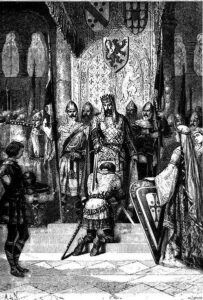
No matter in what sequence the Church bestowed these virtues upon the warrior, she gave him a definite aim and object — a precise law.
The law was the Decalogue, the Ten Commandments of chivalry, which we purpose to illustrate.
The object was to enlarge the Kingdom of God on earth.
When our knights attended Mass one might have seen them, before the reading of the second lesson, draw their swords and hold them unsheathed in their hands until the reading of the lesson was finished. This defiant attitude seemed to imply their readiness to defend the Gospel. “If the Word is to be defended, we are ready.”
This is the whole spirit of chivalry.
[…]
Would you know the true thought of the Church? Open the official book where it is carefully formulated — open the Pontifical and read: —
“Receive this sword in the name of the Father, the Son and the Holy Ghost; use it for your own defense, for that of the holy Church of God, and for the confusion of the enemies of the Cross of Christ. Go, and remember that the Saints did not conquer kingdoms by the sword but by faith.”
To sum up in a few words, chivalry has never been, is not, and never will be anything but armed force in the service of unarmed truth. And I am not aware that anyone has ever given a higher or more exact definition of it.
(León Gautier, Chivalry, trans. Henry Frith (London: George Routledge and Sons, Ltd., 1891), 23 and 38.)
It is on account of this dedication that the Crusader, more than any other warrior, holds the position of highest honor and veneration even to our own day; and why his sword remains the object of such inspiration as no other weapon to date.


